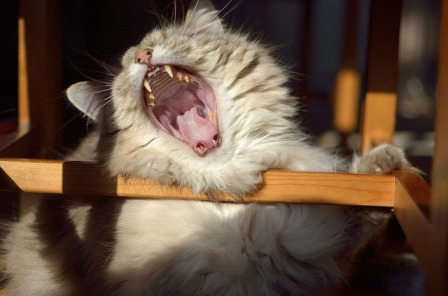Bad Breath in Cats
Bad Breath in Cats
Every cat can have bad breath from time to time. The occasional foul odor of their mouths usually comes from the food they eat, such as canned tuna. However, if a cat suddenly gets bad breath, which persists for some period, then it could point out to some other cause. In this case, we as cat caregivers should pay attention to other possible symptoms. According to veterinarians, the most frequent cause of bad breath in cats is dental health. Periodontal disease often produces fetid odor in cats and needs to be treated professionally. Nevertheless, bad breath in cats can indicate some other problem that can seriously affect the health of our cat. If bad breath is accompanied by some other symptoms such as weight loss, drooling, vomiting, diarrhea, lethargy, thirst and frequent urination, then it is highly recommended to see the vet immediately. To find out more about the cause of bad breath in cats that are not directly linked with dental problems, we can consult the article Understanding the Common Causes of Halitosis (Bad Breath) in Cats.
Bad Breath in Cats
Tartar and plaque build-up around the teeth. Check the outer base of your cat’s teeth for a hard yellowish coating (plaque). As with people, small particles of food remain in the mouth after eating. These food particles decompose creating conditions where bacterium thrive. These bacterium grow to form plaque – a combination of bacteria, mineral and decomposed food. Plaque build-up clings to the base of the teeth causing the gums to become inflamed and recede.
Abscess or Infection. Check for reddish, swollen gums. As the infection spreads to the sinuses it generally results in a swollen face. Abscesses have to be drained by your veterinarian and the infected tooth may have to be extracted.
Diabetes, kidney disease, liver disease or an intestinal blockage.
Mouth ulcers, mouth sores or even cancer.
Something caught in your cat’s teeth or under her gums. For example, food, a strand of hair, or string can get lodged in between teeth and decompose. This will infect the surrounding tissue and cause a bad odour.
Teething – At the age of six months old cats start losing their baby teeth. During this time, the gums appear red and swollen and you can see new teeth breaking out.
Canned and soft foods can also cause bad breath. Hard kibble helps to clean teeth and massage the gums without leaving residue. As the cat chews there is excess production of saliva which dissolves any plaque that may have formed.
Even though these causes can seem more serious than dental issues, we should not underestimate the effects that neglected dental health of our cat can have on its overall condition. According to veterinarians, bacteria that are the main product of periodontal disease and by-product of bad dental health can cause the problems in other body organs such as kidneys, liver, and heart. Spreading of the bacteria can even seriously harm them. For that reason, bad breath in cats that is prolonged should not be overlooked. Often, it can indicate a more serious problem, and if early noticed, it helps us to do something on time. In this way, we can prevent and even stop bacteria progressing further.










